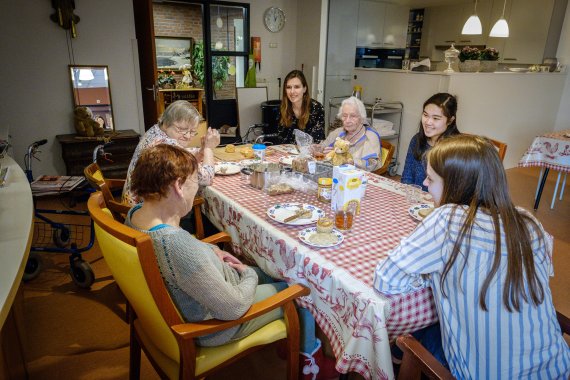Students Michelle van Maanen, Amber Yau and Lisa Verhoeven (from left to right) have lunch with residents of Pieter Pauw nursing home. Photo Guy Ackermans
The common room in the nursing home is divided into a kitchen-diner and a living room. There are two old paintings of farm life on the wall, and a lot of easy chairs. They look as though they come from a secondhand store and make for a cosy, domestic atmosphere.
It is lunch time at Pieter Pauw nursing home in Wageningen. The table has been laid with traditional Dutch tableware, chocolate sprinkles, peanut butter, apple syrup and currant bread. Mrs Ten Berg is eating a slice of bread and peanut butter with a knife and fork. She has a mischievous look in her eye. Lisa Verhoeven can’t help laughing when Mrs Ten Berg says she gets a lot of visitors, luckily, but her neighbour needn’t come anymore because they always quarrel. Verhoeven helps serve lunch and keep the residents company. She is a first-year student of Business and Consumer Economics.
Ludo
Lisa Verhoeven and Michelle van Maanen, a student of Food Technology, sometimes play a game of Ludo with Mrs Ten Berg, and they usually lose. ‘Which is just as well,’ says Mrs Ten Berg, ‘because I’m a bad loser. Yes, I’m quite a character, you know!’ Opposite her sits Mrs Haverhals, 98 years old and never ill. Her husband died a long time ago. ‘But I have Knuffie,’ she sasy, pointing to a teddy bear on the table. Mrs Haverhals’ zimmer frame is parked against the leg of her chair.
One of the supervisors is standing in the open kitchen that looks out on the dining room. ‘These residents are still fairly independent, but the residents nextdoor all have serious physical disabilities,’ she says. ‘We really have to work in pairs there in order to use the hoists if we wash the residents, for instance.’ These are the times when it is handy to have volunteers such as Lisa and Michelle around to pay attention to the other residents, having a chat, doing a puzzle with them or taking them for a little walk.
Through this work I’ve become more conscious of my own health
Difficult
The first time the students came to Pieter Pauw, the residents regarded them with suspicion. ‘I found that very difficult,’ says Verhoeven, who had never had any contact with elderly people with dementia before. ‘I felt a kind of hostility. The residents didn’t want to talk to us at all. And certainly not play games.’ Now the students are greeted with enthusiasm. Verhoeven and Van Maanen find the work they do here satisfying and worthwhile. ‘Because I come here and see what it means to suffer from dementia, or another condition, I have become more conscious of my own health,’ says Van Maanan, ‘and of the fact that I live in a country where this kind of care is on offer.’
The only man in the group, Mr Jongsma, sits at the head of the table during lunch. He slips slowly down his chair. ‘It hurts,’ he says, almost unintelligibly. Mr Jongsma has Parkinson’s disease. Verhoeven often sits with him and doesn’t find it easy. ‘He often wants to stand up but if the supervisors are busy elsewhere, I have to keep pushing him gently back into his chair.’
Lunch is over. One of the ladies settles into an armchair, while Mrs Ten Berg helps with the washing up. The clock above the dresser has stopped at 12 o’clock. The students say goodbye. It’s time for lectures.
On request of the nursing home the names of the residents are feigned.

